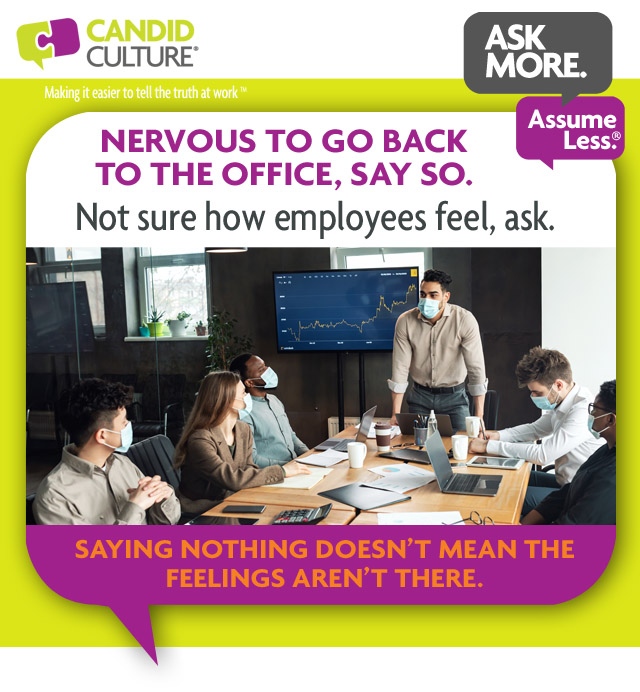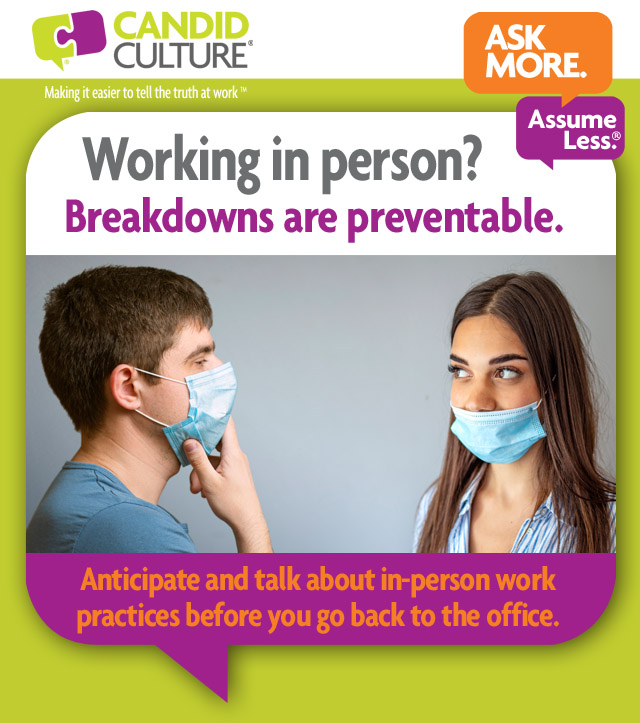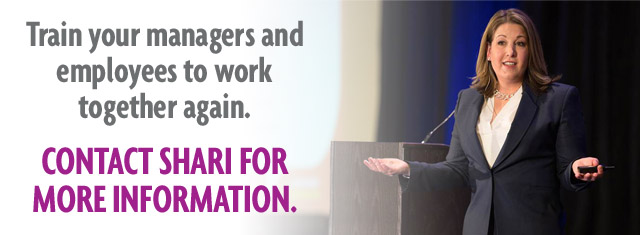Posts Tagged ‘office environment’
It’s been almost two years that we’ve been looking into people’s homes on Zoom. Life and work have changed, and people have a variety of feelings about those changes. Some people miss working in person and can’t wait to go back to the office. Some people love working from home and never want to go back. What’s important is the ability to talk about how we feel and what we need from work – with the people we work for.
Most people suffer in silence, concerned to ask for what they want or need at work. Managers find out their employees are unhappy when they come across employees’ resumes on the internet.
The world has changed and how we interact needs to change to. Your manager may not be able to allow you to work from home all the time, but she certainly won’t if you don’t tell her what you want.
We need to cross the line, having conversations that perhaps we haven’t had in the past.
Managers, in addition to checking in on work progress, talk about how employees are doing and what they need going forward to be satisfied and do their best work.

Questions to ask during regular check-ins:
I’m not a fan of asking, “How are you doing?” It’s a vague question, and vague questions produce vague answers. But many employees will go their whole career without being asked how they’re doing. It demonstrates caring. It’s a place to start.
Here are some better questions to ask employees:
- What’s changed for you in the last 18 months?
- What have you learned about yourself in the last 18 months?
- What has changed about what you need from work, if anything, in the last 18 months?
- What would you tell me if you weren’t concerned about how I would react?
Managers, even if you ask these questions, employees may not feel comfortable answering. Managers can lead by example by talking about themselves. Share how your life, needs, and desires have changed. Share your own constraints. When managers show vulnerability, they convey it’s ok for employees to do so as well.
Also, tell employees that you really want to know the answers to the questions and assure employees there won’t be negative consequences for speaking candidly. Projects won’t be taken away. Careers won’t be impacted. You’re just talking. If employees never want to come into the office or travel, or want to work part-time, yes, jobs and careers may be impacted. But a conversation is just that, a conversation.
You won’t get what you don’t ask for.

Perhaps you’re going back to work in person part or full time and you’re nervous. Will people sit closer than you’re comfortable sitting? Will people wear masks? Will someone ask you to wear a mask when you don’t think it’s necessary? Yes, yes, and yes. All of these things are likely to happen. And addressing each situation will be uncomfortable. The good news is, if all of these events are predictable, they’re also preventable.
The time to talk about how people will behave in the office, is before people return to the office. Preventing a breakdown is always easier than addressing one.

Managers, get your team members together via phone or video and outline the organization’s expectations around masks, physical distancing, etc. Be explicitly clear. “Everyone is expected to be courteous and use common sense.” is not clear. My definition of being courteous and using common sense is different from yours. Follow the meeting up with written expectations that reiterate what you outlined during the meeting.
Direct reports, speak candidly with your managers about what you need. If you’re not comfortable working in an open floor plan, talk about it before you go back to the office. If you’re not comfortable attending a meeting with others in a conference room, have the conversation before the first in-person meeting. It’s ok to have concerns, and it’s ok to talk about them.
Teams, get together via phone or video before you go back to the office and agree on the practices you will follow. For example, if your organization’s policy is to wear a mask and a team member’s mask is below their nose, everyone on the team has the right to ask the person to pull it up. If a team member feels people are sitting too close, it’s ok to ask for space.
My point isn’t which Covid safety practices to employ. My point is to have the conversations before you return to the office. Anticipate every possible outcome. Talk with friends and colleagues who are already working in person and ask for the pitfalls and breakdowns they’ve experienced. Set clear expectations with your manager, peers, and internal and external customers. Then agree to talk about breakdowns as they happen. If you can predict it, you can prevent it.


The inspiration for this week’s blog came from the most unlikely source, time with my son. I want each of his days to be exciting and fun. On the days we do nothing but hang out and play at home, I feel like I’ve failed just a little bit. It’s a lot of pressure. Not unlike work and creating an office culture.
I want each of my employees to be happy and to enjoy their jobs and enjoy working for me, every day. That can’t and won’t happen. Some days are hard. Some are dull. Sometimes I’m fun and easy to work for. Lots of days I’m not.
I had a manager years ago who told me that my need to be liked by my employees would take me down. He was right. Unfortunately, I’m not the only manager with this challenge.
Lots of managers tell me they’re hesitant to give feedback because they’re afraid employees will quit. Other managers do work they know they shouldn’t be doing, because they don’t want to burden their employees.
Not every day will be great. And that’s ok. Work is a roller coaster. Some days are awesome. Others are the pits. Your job isn’t to make people happy at every moment, it’s to create a supportive environment and ensure people have the tools to be successful.
My son has a clean and safe home full of fun toys. I’ve created a positive environment for him. My employees have all the tools they need to be successful. I work hard to set clear expectations and give timely positive and upgrade feedback. The rest is up to them. Some days I’m sure they’re happy. Most days, hopefully. And then I’m sure there are days that a job at Taco Bell sounds appealing.
Here are five actions to create a positive culture at work:
Office culture tip #1: Set clear expectations at the beginning of every new project and task. The root of frustration and unhappiness is thwarted expectations.
Office culture tip #2: Ask for and be open to feedback from your employees and coworkers. Ask for feedback regularly and work to respond with, “Thank you for telling me that.”
Office culture tip #3: Respond to feedback by changing what it makes sense to change. Giving feedback that is never acted upon creates cynicism and distrust.
Office culture tip #4: Provide rationale for your decisions. It’s fine to do things the way you want to do them, even if others disagree. Explain your rationale. You’ll get more buy in.
Office culture tip #5: Don’t be afraid to make decisions that are unpopular. There is a reason that you want to do what you want to do, the way you want to do it. Vet your plans, when appropriate. Be open to others’ input. And then do what you think is right (within the scope of your role).
Your job isn’t to please everyone and trying to do so will likely produce lesser results and be exhausting.





 I had a colleague at my last job who was a peer and a friend. We were at a similar level and would periodically sit in one of our offices, with the door closed, talking about the bad decisions our company’s senior leaders made. One day I realized that these conversations were exhausting to me. They were negative and didn’t make me feel better. In fact, they made me feel worse.
I had a colleague at my last job who was a peer and a friend. We were at a similar level and would periodically sit in one of our offices, with the door closed, talking about the bad decisions our company’s senior leaders made. One day I realized that these conversations were exhausting to me. They were negative and didn’t make me feel better. In fact, they made me feel worse.
Some people distinguish between gossip and venting, asserting that venting is cathartic and makes people feel better. It doesn’t.
I’ll use an analogy I read in one of Deepak Chopra’s books. When you put a plant in the closet and don’t give it light or water, it withers and dies. When you put a plant in the sunlight and water it, it grows. And the same is true for people. Whatever you give attention will proliferate. Whatever you deprive attention will go away.
Your life is made up of the people you spend time with and what you talk about. What are you talking about?
In addition to draining you of energy and ensuring you focus on the things that frustrate you, gossip in the workplace kills the organization’s culture. If employees can’t trust that their peers won’t talk about them when they’re not there, there is no trust in the organization. And you can’t have real relationships without trust.
Gossip isn’t going anywhere. It’s a human phenomenon and is here to stay. But you can reduce gossip.
A few ways to reduce the gossip in the workplace:
- Address the gossip head on.
“I’ve been hearing a lot of gossip, which is not good for our culture.”
- Hold regular town hall meetings, and give employees information about initiatives, organizational changes, profitability, etc. Employees want to know how the company is really doing and what they can do to contribute.
- Create a no gossip in the workplace policy.
“We want people talking directly to each other, rather than about each other. As a result, we’re putting a no gossip policy in place.”
- Draw attention to gossip.
“Every time you hear gossip, wave two fingers in the air.” This will draw attention to the gossip in the workplace without calling anyone out.
Also, ask your peers and friends not to gossip with you. End conversations that contain gossip. This will be hard to do, but if everyone does it, it will become much easier.
- Have an agreed-upon consequence for gossip.
“Every time we hear gossip in the workplace, the gossiper owes a dollar. Every quarter the gossipers will buy the office lunch from the gossip jar.”
The keys to reducing gossip in your office are to draw attention to the gossip, have a consequence for gossiping, and over communicate so your employees don’t have to make stuff up. Employees want to know what’s happening in the organization. In the absence of knowledge, people make stuff up, and it’s never good.
Venting and gossip are the same. Unless you’re planning a conversation with a coworker or friend to address a challenge or problem, you’re gossiping. And talking about what frustrates you will only make you more frustrated.
My advice: Do something about the things you can impact and let the other stuff go. Talk about the things that matter to you. Resist the temptation to speak negatively about the people around you. And know that anyone who will gossip about someone to you, will also gossip about you.












 I had a colleague at my last job who was a peer and a friend. We were at a similar level and would periodically sit in one of our offices, with the door closed, talking about the bad decisions our company’s senior leaders made. One day I realized that these conversations were exhausting to me. They were negative and didn’t make me feel better. In fact, they made me feel worse.
I had a colleague at my last job who was a peer and a friend. We were at a similar level and would periodically sit in one of our offices, with the door closed, talking about the bad decisions our company’s senior leaders made. One day I realized that these conversations were exhausting to me. They were negative and didn’t make me feel better. In fact, they made me feel worse.